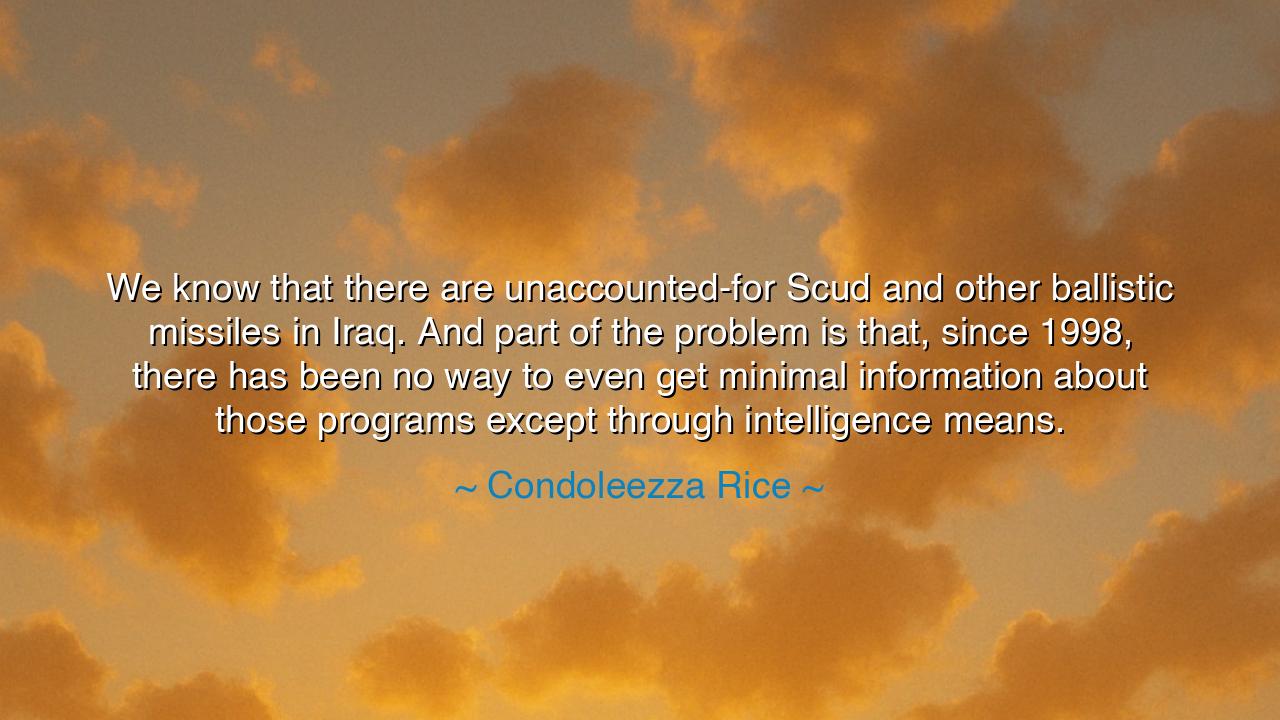
We know that there are unaccounted-for Scud and other ballistic
We know that there are unaccounted-for Scud and other ballistic missiles in Iraq. And part of the problem is that, since 1998, there has been no way to even get minimal information about those programs except through intelligence means.






“We know that there are unaccounted-for Scud and other ballistic missiles in Iraq. And part of the problem is that, since 1998, there has been no way to even get minimal information about those programs except through intelligence means.” — Condoleezza Rice
Listen well, O students of history and keepers of vigilance, for within these words of Condoleezza Rice lies a lesson written not in ink, but in the weight of nations. When she spoke of unaccounted-for Scud missiles, she did not speak merely of weapons, but of the fear that hides in the unknown, and of the peril that shadows the limits of knowledge. For where information ends, imagination begins—and in that void, the seeds of war and misunderstanding often take root. Her words, uttered in the trembling years after the Gulf War and before the great storms of the early twenty-first century, reflect the eternal struggle between security and uncertainty, between truth and the fog that obscures it.
The Scud missile, that instrument of fire born in the mid-twentieth century, became more than metal—it became a symbol of menace. In the 1991 Gulf War, these missiles rained down upon cities, carrying not only destruction but dread. And when the wars were done and the inspectors withdrew in 1998, the world was left with questions—questions heavier than any bomb. “Where are they? Who holds them? Do they still exist?” In that silence, Rice’s warning emerged: that the absence of knowledge is not peace, but danger disguised as calm. For when the eyes of the world turn away, the dark has room to grow.
The ancients knew this truth well. Recall the fall of Troy, which came not from might alone, but from deception unseen. The Trojans, blind to the truth within the wooden horse, welcomed their own destruction through ignorance. So too does every empire, every government, every people face ruin when it chooses blindness over vigilance. Rice’s lament was not only for her time, but for all ages—that intelligence, though flawed and fallible, is the lamp that must remain lit in the world’s darkest corners. Without it, nations walk as sleepwalkers upon the edge of a cliff.
And yet, her words also bear a warning against pride. For to seek truth through intelligence is noble, but to believe that one’s knowledge is complete is folly. The invasion that followed, justified by fears of unseen weapons, revealed how assumptions can become shadows that deceive the wise. Even the most learned can be ensnared by the mirage of certainty. Thus, from this moment in history, two truths emerge: one, that ignorance breeds danger; the other, that overconfidence in partial knowledge breeds disaster. The wise ruler must hold both truths in tension, as a sailor steers between reefs on a stormy sea.
There is in this quote a deeper reflection on the nature of human perception itself. We live not in full light, but in fragments—seeing only pieces of what is, guessing at what may be. Yet in the realms of governance, as in the heart of every human life, decisions must still be made in this half-light. The true test of wisdom is not in having perfect knowledge, but in having prudence, humility, and discipline when knowledge fails. Rice’s acknowledgment of this limitation—“no way to even get minimal information except through intelligence means”—is not an excuse, but a cry of realism. It is the lament of all who stand between chaos and order: those who must act when certainty is beyond reach.
Consider now the lesson of Athens and her fall to Sparta. The Athenians, famed for their brilliance and rhetoric, were undone not by lack of power, but by the arrogance of thinking they knew their enemies’ hearts. They mistook shadows for truths, and pride for foresight. Thus, the oracle of history speaks again: beware the illusion of knowledge, for it is the most dangerous ignorance of all. The wise leader does not trust blindly, nor doubt endlessly, but moves with measured steps between vigilance and restraint.
So take this teaching to heart, O thinkers and guardians of your age: whether you govern nations or merely your own conscience, remember that intelligence—both worldly and inner—is the light by which you walk. Seek it diligently, but hold it humbly. When you cannot see the full horizon, do not rush into darkness with arrogance, nor stand still in fear; instead, move forward with awareness, curiosity, and care. For ignorance left unchallenged gives birth to danger, and certainty unexamined gives birth to folly. Between the two stands wisdom—the rarest weapon of all, and the only one that has ever truly preserved peace.






AAdministratorAdministrator
Welcome, honored guests. Please leave a comment, we will respond soon